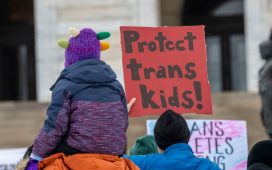[bell dinging]
[calm instrumental music]
[Andrew] My name is Andrew and I live in Oakland.
I woke up at around 10.
Usually there’s a good amount of light
coming through my window,
and there was no light coming through my window
and I went to opened my front door
and there it was, you know?
Yeah, it was like nighttime.
It was red. It was very red.
[calm instrumental music]
It was just a huge new statement from nature
that we ought to be paying attention.
In September of 2020,
we really had a horrifying coming together
of different conditions that amplify wildfires,
very unusual air circulation patterns
and dramatic convergence
over an area with millions of people.
[Interviewee 1] I live in the Mission in San Francisco.
I remember waking up that day being extremely confused.
[Interviewee 2] Just being afraid, collectively afraid,
with everyone else.
[Interviewee 3] That was like the end of the world.
And it was this orange glow. Super dark.
[people chattering]
[Interviewee 4] Like, um, you know, Mars.
For many people, the world was just a lot less comforting
and hospitable than it had been the day before.
[calm instrumental music]
September of 2020 was a period of the largest wildfires
the state of California has seen in recorded history.
On September 9th,
there were almost 500,000 acres ablaze in Oregon
and tremendous amounts of smoke were being released.
The quantity of smoke was very, very high
then it was converging on the state.
[dramatic instrumental music]
Smoke wasn’t right against the ground.
It was up several thousand feet in the atmosphere
where it was mixing with fog to create essentially a blanket
that the sunlight had to come through.
We had decent air quality close to the ground,
but we’re looking at a world with illumination
that was coming through this smoke cloud above us,
so dense that people noticed
as the day September 9th went on
that it got darker and darker during the day,
rather than lighter and lighter.
[dramatic instrumental music]
And the reason the cloud is red is kind of like the reason
that sunsets are red.
White sunlight is all the colors of the rainbow.
The light with shorter wavelengths, the blues, the greens,
don’t make it through a dense cloud like that.
Only the light with the longest wavelengths,
the oranges and the reds, make it through.
And that’s why the sky seemed like it was
this orangy-red-y color.
[dramatic instrumental music]
Recognizing that it was like a signal
that was putting a giant exclamation point
around how serious and unusual our situation was.
[dramatic instrumental music] [images popping]
The most recent studies indicate
that in the last couple of decades,
about half of the increase in wildfire activity
is a direct result of the climate changes
that have already occurred.
In the last 30 years or so,
climate change has basically doubled the amount of area
that we lose in wildfires and in a typical year.
[Driver] Okay, where do we go?
[Chris] What climate change does
is act very, very efficiently and in a targeted way
to dry the most flammable components of a forest,
the small twigs, the leaves.
Just a few days of hot temperatures and dry winds can change
these little twigs and leaves
from maybe you could set them on fire
to almost being explosive.
[dramatic instrumental music]
[Driver] Oh, it’s so hot.
Climate change definitely causes more wildfires,
more days when we have wildfires,
more days when we have heavy smoke.
[Driver] Where are my wife and kids?
The challenges that people in San Francisco faced
around Orange Day are nothing in comparison
to what the people whose lives are at risk
from rampaging, out-of-control wildfire are.
Orange Day was more than anything else
just a giant exclamation point
about how serious the conditions are
and how weird the situation was.
[dramatic instrumental music]
[Interviewee 5] I feel like they are getting worse,
and I feel like the fires are just gonna be
a constant thing.
[Interviewee 6] It’s hard not to have
an apocalyptic consciousness.
[Interviewee 7] It just means that climate change
is upon us, as we’ve been warned for so long.
[Interviewee 8] Seems to fit with the idea
of the future being gloomier,
and this is gonna become more ordinary.
[Andrew] The reasons that this dark sky
was these terrible fires that had caused so much damage
and loss of life, and that every year it’s getting worse
due to climate change, so.
[dramatic instrumental music]








